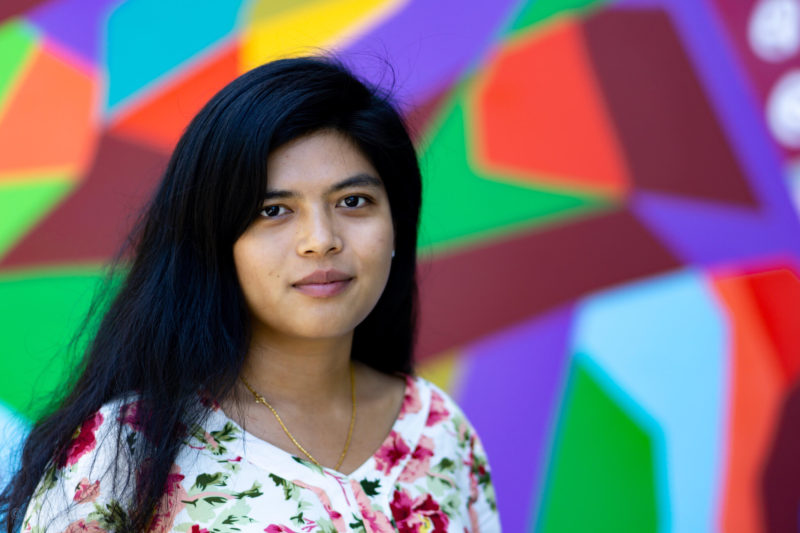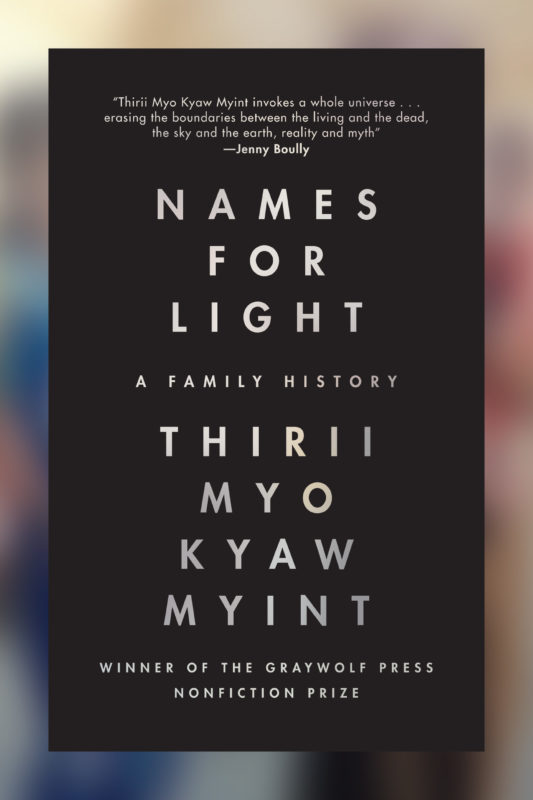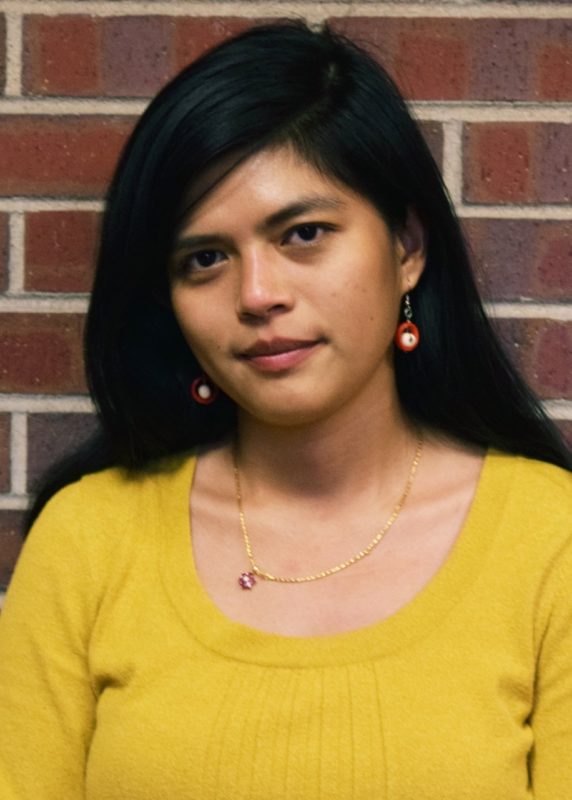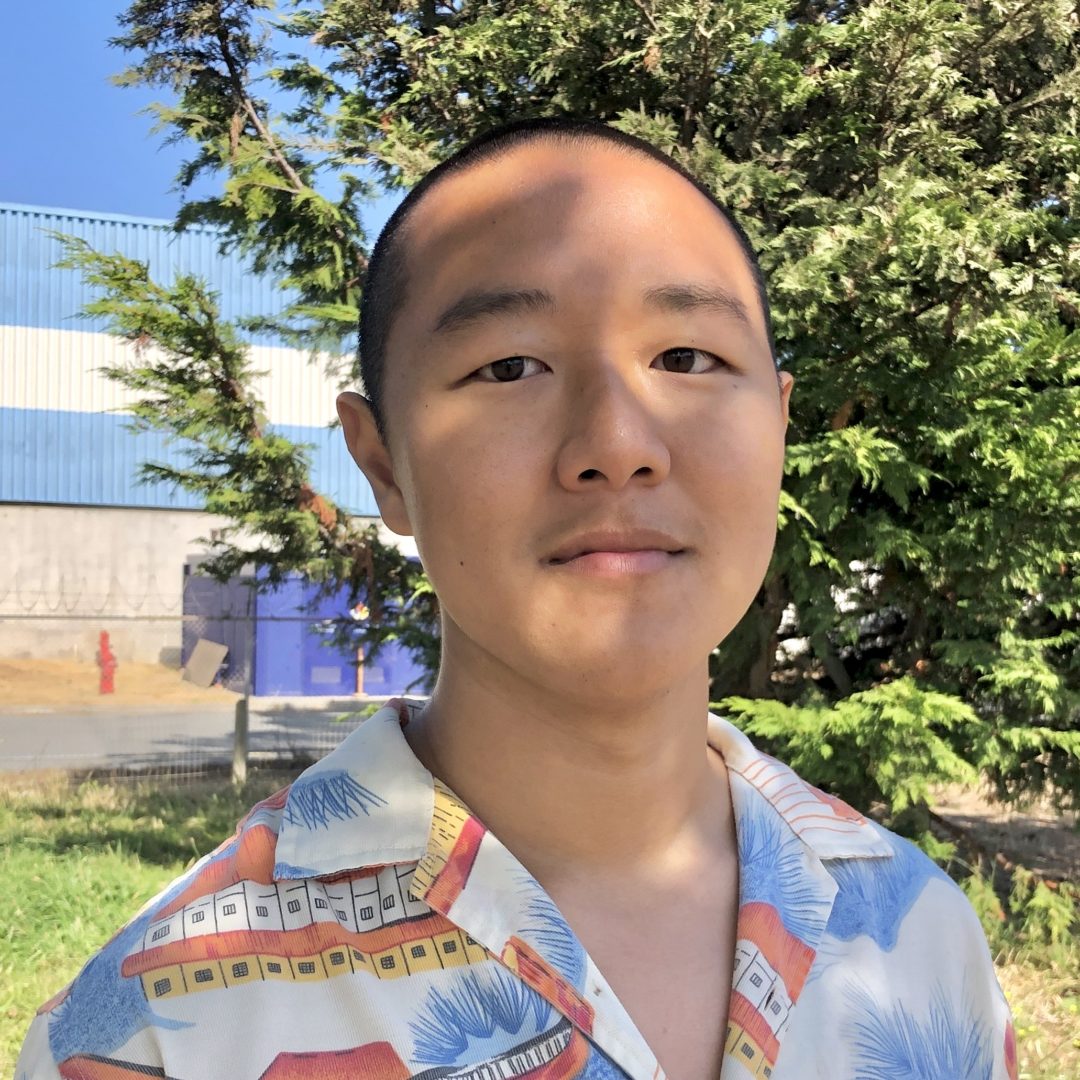Deputy Editor Sydney Van To talks to Thirii Myo Kyaw Myint about Burmese cosmology, endings and beginnings, nationalism, and literary representation. Thirii Myo Kyaw Myint’s memoir Names for Light: A Family History is the winner of the 2018 Graywolf Press Nonfiction Prize and a finalist for the 2022 PEN Open Book Award.

Sydney Van To: In this book, you are always aware of the presence of ghosts and spirits and the process of reincarnation. But you also think about ghosts in a figurative way. Ghosts are related to the conditions of exile, loneliness, restlessness, and trauma. You write at one point, “One can be a ghost while one is still alive…if one carries what one cannot remember” (240). I’m curious to hear more about how you approach ghosts as both literal and poetic entities, and how this may not figure as a contradiction—in your writing process as well as in your worldview.
Thirii Myo Kyaw Myint: Right, perhaps there isn’t a contradiction. I have to say, my “worldview” isn’t just mine. It’s my mom’s, my sister’s, my grandparents’. It’s a worldview that I was just born into and that I have to take for granted, and of which I did not become so aware until I was writing, and writing in English. So when you ask that question, I realize that I have to stop and think: what is my process, and how do I think about ghosts? For me, writing is thinking. The stuff that comes out in the process of writing is my thinking. It’s not that I have thought about things beforehand. Maybe that’s a way of dodging the question.
For me, ghosts are real: when people die, they might transfer into a different realm, the spiritual realm. But even “ghost” is not an accurate translation. In Burmese, “သရဲ” is a scary and horrific ghost and is a disrespectful term that I would not use when talking about my ancestors. There probably is a word for referring to my ancestor as a spirit, but my Burmese isn’t good enough to know what it is. I guess that if I were talking about a dead ancestor, I would still just use their name or their relationship to me. And I would add, “comma, they’re dead.”
Sydney: Right, you wouldn’t label them as a ghost. They would still have their name.
Thirii: They would still be themselves. You would just remember that they are dead. It is not a new state or a new identity. It’s just that they’re dead. Death isn’t the final thing either. Death isn’t this huge boundary that it would be for people raised in the Judeo-Christian tradition. It’s easy for me to play with the concept of ghosts, death, pre-death, afterlife. Those boundaries are so fluid in the worldview that they become fluid in the metaphorical world as well.
Sydney: There is no clear end with death. But this makes me think how your book is so concerned with beginnings. You write, “I am always searching for beginnings.” And the beginning tends to be associated with names. You had been searching for your brother’s name, and the meanings behind different names. What do you hope to find from a beginning? What kind of transformative power do you associate with beginnings?
Thirii: There is a lot of transformative power in the idea of a beginning. My family are devout Theravada Buddhists. I’m still negotiating my relationship to that. But one of its most powerful teachings is that every moment is new, every moment is a beginning. We only have to tap into that in order to harness the power of beginnings.
I’m such a perfectionist and I’ve always been one as a child. So much of my suffering as a child came from this feeling of wanting a fresh beginning, a clean beginning, a new beginning. I would always start diaries, but within a week, two weeks, or at most a month, I would start tearing out pages because I felt that my handwriting wasn’t neat enough, or I made a typo, and I’d white out it but the white-out was bumpy. I always wanted that clean slate. I was so religious as a child because I wanted that clean slate. That no matter how bad I was, I could start over. If only you could let go of your baggage. As an adult, I’m still tied to that. I’m trying to have a healthy relationship with beginnings, one that doesn’t have to erase everything that came before that arbitrary beginning. But also acknowledging the arbitrariness of beginnings, that there is no such thing as a true beginning. I’m starting to have a more mature relationship with that sort of teaching. And when it comes to writing, I get so obsessive with beginnings because I want to find the right way to start a story. But it’s a way to procrastinate and never write the story. I’m starting this new book project and I’m at the beginning, trying to enter, and it’s freaking frustrating. It’s so hard for me, because every time I choose a path, every sentence of every chapter, it just closes off all these other possibilities.
Sydney: It’s all forking paths.
Thirii: Right, that’s a very exclusionary, cause-and-effect way of looking at things. Talking to you, it’s making me realize that maybe I should take a new approach with this project. Maybe it’s okay to have multiple beginnings, and still not have possibilities closed off. Maybe that’s a different form of storytelling which is more aligned with the way that I am. Rather than trying to fit my thinking with a linear Western perspective.

Sydney: I love the way you handle contradictions. The way we are talking about beginnings and endings reminds me of Antonio Gramsci’s famous line about “pessimism of the intellect, optimism of the will.” On the one hand, you have to be optimistic enough to believe that a new beginning is possible. Change is just this impossible eruption. But on the other hand, you have to deal with history. There is, given a more rigorous thinking, no such thing as a beginning. Maybe that’s what the ghosts are: that there is no beginning, that there is so much behind and before you, and they’ll show up, and you can’t make sense of their appearance, except that they’ve always been there.
Thirii: I love that. That feels true to what I am trying to express. Searching for the beginning is like an act of self-affirmation, finding a place for me to stand momentarily, acknowledging that this place is only one arbitrary little place in a much larger picture.
Sydney: Maybe you’re describing what it means to write from a place of displacement. I guess this leads into my question about your relationship to nationalism or patriotism. I imagine it’s in the same contradictory sense of how you relate to your family’s religious beliefs. To briefly summarize, your parents had accepted their assignment to teach in Sittwe as part of a government to improve conditions in rural Burma. This was because your parents wanted to be patriotic, but in the aftermath of their flight, they are bewildered by their former sense of patriotism. In the book, you admit that you don’t ever think you’ll know what it means to be patriotic. This section resonates with me because it reminds me of my own parents’ ambivalent relationship to Vietnam. Given their life stories, I want to respect their nationalist attachments, but I am also wary of nationalism in all forms.
Thirii: In a way, I’m jealous of that innocent or naive patriotism which my parents seemed to have at some point in their life. I can empathize with it on an emotional level. For example, war songs. My dad used to sing nationalist WWII, anti-British, anti-Japanese, marching songs as lullabies! There was this sense of Burma pride, Myanmar pride, we’re going to kick out the invaders, this is our land. That is the sort of nationalism that I can emotionally relate to, even if I wasn’t old enough to understand it intellectually. It was so pure. But it was pure because it was so problematic, because I wasn’t examining it as a child.
But as I learned more about my positionality as a Bamar person of the majority ethnic group, and as also Theravada Buddhist which is the majority religious group, I feel more and more conflicted about that nationalism. It’s especially difficult to negotiate when writing for an American and also Asian American audience who may not be familiar with the ethnic make-up of Burma. I feel a lot of anxiety about not wanting to speak for anyone, not wanting to represent anyone, not even Buddhist or Bamar people, but especially not non-Buddhist and non-Bamar people. I feel a lot of anxiety about that privilege and whether I’m doing enough to address it. If I meet an ethnic non-Bamar person who thinks my book is problematic, I will listen and try to do better.
Sydney: One of the problems of being an Asian American writer may be that when you write about family history, it’s difficult not to somehow verge into nationalism. Simply on the level of form, the family narrative is so often tethered to the historical events of a nation and its diaspora.
Thirii: It’s an unfair burden that is placed on us. I never claimed to be writing the history of Burma. But I know that is how my book will be read, at least by some people.
Sydney: Your book is doing two things at once. You’re confronting the history of Burma, but also the politics of the literary market. I see this as your way of laying claim on absences. We grow up and are thrown into this world, confronted with the absences of all sorts of facts and knowledges. The absences of history and the absences of your own identity. You decided to choose and take control over absences in this book, and say, no I won’t talk about the 8888 strike. It’s an act of protest, but it’s also formally generative.
Thirii: Those absences are weirdly the things which people always want me to talk about. When I meet someone new and they learn that I am Burmese, it’s always, “I read about the coup,” “I watched this movie about the dictatorship,” or “What do you think about the Rohingya?” I’m not going to answer those questions in the book because I’m already answering them everyday. That’s not to say that I don’t think it’s important to talk about what’s happening with the Rohingya. It’s just not what I want to do in my book. We don’t expect that of every American writer.
Sydney: We’ve talked about your position as a writer with respect to the nation, to the world literary market, to Asian America. I want to hear about your position as a writer with respect to your own family. What was the process of interviewing your family like? Did they have any input or expectations about how they wanted the book to turn out?
Thirii: If they did, they were really good about not telling me what those expectations are. I’m lucky to have had such a supportive family, immediate and extended. Their reaction was completely positive. My mom said that I gave language to things which she felt but could not express. That was the best review that I could have gotten from anyone. I didn’t care what else happened with the book because the people who I was closest to, who I love, got something out of it. I interviewed them for many years, many rounds of interviews, and they were my collaborators and very involved in the process. But they never tried to control it at all.
Sydney: That’s so wonderful. Well, I had lingered on this one line in the last pages of your book, where your mom said, “I feel things as well, even though I’m not a writer like you.” What you’ve just shared makes me question my original interpretation of this scene. I had originally read this as a kind of pushback, feeling that you were laying claim upon their feelings or your privileges of representing them. So where did that comment come from?
Thirii: Actually, it was a really tender moment. My mom is—how do I put this—a hardass. She doesn’t like hugs. My dad can’t fall asleep unless he’s touching her, but she can’t fall asleep if he’s touching her. She’s sensitive but not touchy-feely. We were sitting in the car while waiting for my dad to get something from Target. We were looking at the sunset. The sun was setting, and we were in the Target parking lot looking at those tiny parking lot trees and bushes. She said, “It’s really beautiful” and I was like, “Yeah, it is.” She said, “I can’t describe things as well as you, but I feel things as well.” She was saying that she also has that artistic vision even if she doesn’t have an outlet for it.
Sydney: That’s almost like the flipside of what you had relayed about your mom earlier. That she had said, “you articulated my feelings,” and now she says, “I have feelings which can remain unarticulated.”
Thirii: Yeah. That’s why that comment was so meaningful to me. Because I know that she has really deep feelings. And to know that I was able to connect with those feelings in some way is so cool.

Thirii Myo Kyaw Myint was born in Yangon, Myanmar and grew up in Bangkok, Thailand and San José, California. She is the author of the lyric novel The End of Peril, the End of Enmity, the End of Strife, a Haven (Noemi Press, 2018) and the memoir Names for Light: A Family History (Graywolf Press, 2021). She is an Assistant Professor of English at Amherst College, where she teaches creative writing and literature.

Sydney Van To is the deputy editor of diaCRITICS. He is currently a PhD student in the Department of English at UC Berkeley, with research interests in Asian American literature, critical refugee studies, and genre.


